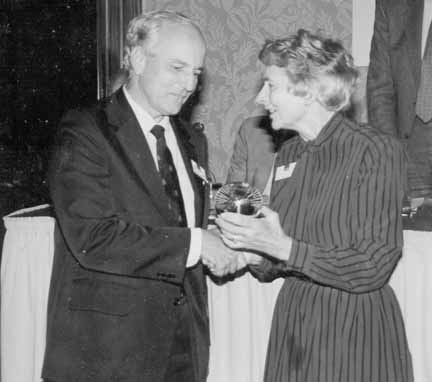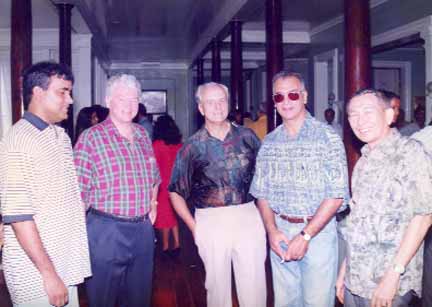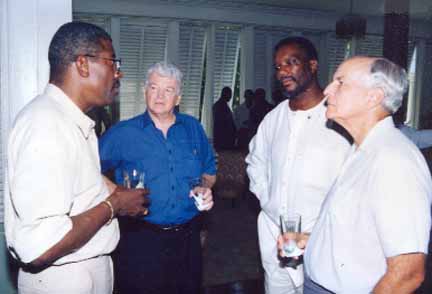Excerpt from a speech at a Commonwealth Press Union conference in Edinburgh, 1992, after receiving the Astor Award
I speak as a relative novice, having plunged in at the deep end with little editorial experience five-and-a-half years ago when we started a weekly newspaper in Guyana. Guyana had at that time been through an experience similar to that in some other ex-colonial territories in the post-independence period. The government had gradually secured a monopoly of the media which was complete in the early seventies and freedom of the press had been obliterated in the process. The state owned press and radio faithfully followed the line of the party in power and news was monitored and selected accordingly. When we started in 1986 there had been state control of the media for some 13 years.

President Hoyte said he had no objection to us starting a newspaper in 1986 but on one condition. Because of an acute shortage of foreign exchange in the country and with the existence of stringent exchange control legislation the government was not prepared to allocate any foreign exchange to us to import newsprint, films, plates and everything else we needed from abroad. The condition on which he agreed to us starting was that we could subsist without requiring foreign exchange from the state. This meant that we needed a grant. Mr Ken Gordon of the Trinidad Express who was helping us get started was able to obtain a grant from the National Endowment for Democracy in Washington which paid for the printing of the newspaper by the Express for some nine months. We started as a weekly on that basis. The flats were flown to Trinidad each week and we chartered a small aircraft to fly the newspapers back. The logistics were complex but that’s how we got off the ground.
I made my own efforts to raise a grant in England but without success. I visited the Commonwealth Press Union Office in London and was very cordially received but discovered the CPU was not in the business of making grants. I drew a blank elsewhere.
The National Endowment for Democracy (NED) was an institution set up by the US government to provide financial assistance to organisations working toward an open society in both left wing and right wing dictatorships in Latin America, Eastern Europe and elsewhere. We later discovered from one of its reports that the Polish trade union Solidarity was a major grantee.
When Ken Gordon told us of the availability of a grant, my colleagues and I in Guyana decided, after some debate as to whether the governmental source of the funds could be seen to compromise us, to accept it and to announce it in detail in our first issue, and at a press conference to announce the launching of the paper. We were assured there were no strings attached and there was never the slightest attempt at editorial interference of any kind.
To the consternation of ourselves and other grantees throughout the world, the New York Times some time later ran a story suggesting that the NED has CIA connections. This was very strongly denied by Walter Mondale and other leading NED persons. The allegation was, nevertheless, obviously a source of great embarrassment.
I would mention as a participant that the Caribbean Publishers and Broadcasting Association which includes all the leading media in our region, receives an annual grant from NED which has been helpful to the region’s media.
We later received a grant from a Dutch foundation to which I was introduced by Mr Harold Hoyte of the Barbados Nation. When that ran out we bought foreign currency on the black market and survived, albeit illegally, in that manner for some time. Indeed, we were frequently faced with closure as obtaining currency was often difficult.

I later devised a scheme which was published in the CPU Quarterly whereby if newsprint was supplied to us by colleagues abroad we would pay for it in Guyana in Guyana dollars at full commercial rates and these funds could be used to start a school for journalists in Guyana or, if that were not feasible, for charitable purposes. There was no response to this.
Fortunately, our problem was eventually solved with the introduction by the government of cambios which permitted free purchase of foreign exchange.
We have never, in the nearly five years since we acquired our own press, been able to print off the main electricity supply. We still run our twenty-three-year-old reconditioned press off our own private generator. The main electricity supply is frequently cut off and sometimes gives power surges which affect our camera, computers and other electrical equipment. These suffer from repeated breakdowns, and we are often not far behind. The ongoing brain drain has also severely depleted the skills available. When we started we had one trained journalist and hardly anyone with technical skills. Indeed raising the money to buy the press, which was difficult enough in our case, was only a small part of the burden. Like any other business, you have to sweat it out to succeed. But there was an extra element of difficulty in our case which often drove us to the brink of despair and collapse.
We have not faced censorship, violence of any kind, or any of the more serious hazards to which journalists in some other countries are subject. Our major and often crippling problems have been a collapsed infrastructure (electricity, phones, transportation) and the severe shortage of crucial skills. These combine to make the normal business of bringing out a newspaper extremely enervating.
There have been some pressures, several verbal attacks, some quite vicious, but these are part of the game anywhere. Governments don’t like criticism, especially ones that are laboriously reconstructing themselves from a dictatorial past. They tend to lash out more or less frequently but this is par for the course. I learnt very early on that running a newspaper is not the best way to win a popularity contest…
We had two major editorial themes, the return of full democracy and an open society and the dismantling of state control of the economy which has been a disastrous failure. Glasnost and perestroika you might say. Guyana has a complex political history which we cannot go into here. Suffice it to say that we face elections later this year which may signify a return to fair elections after two decades of rigged elections. There will be a Commonwealth observer team. And there has been a fundamental change in economic policy and government has indicated an intention to divest most state-owned industries and has already privatised some.
There is freedom of the press in Guyana today and Mr Hoyte must be given some credit for this. Participating in the gradual opening up of the society has been a testing but rewarding experience. The state media have improved under the stress of competition but are still fundamentally unreconstructed.
I would like to turn now to the subject of a newspaper’s responsibility. What has a newspaper’s responsibility got to do with human rights, which is the banner under which I speak today? I believe this responsibility can be grounded on the right to communicate, a ‘third generation’ human right, to use the language of the McBride report of 1980 entitled ‘Many Voices, One World,’ on the possibility of a more just and more efficient world information and communication order. The idea of that order is no longer with us and there are many who do not regret this largely because of the very substantial role implicitly envisaged for governments in that order (indeed, because of the genesis of the idea, governments and not the media were the main actors in the discussion). But there were some good things in that report which deserve our attention. These third generation rights, following the first generation (civil and political rights) and second generation (social and economic rights) are rooted, to quote from the report, “in solidarity, and are seen as comprising for example the international right to development, the right to a healthy environment, the right to peace, the right of access to the common heritage of mankind rights whose distinctive feature is that they all support a humane conception of life.
“It is surely highly desirable,” the report continues, “to include among them the right to communicate — a wide-ranging formula embracing the right of local communities and minorities of all kinds to make their voices heard and the right of peoples to reciprocity and exchange of information.”
It is in the pursuit of the latter concept, I suggest, that we can find part of the rationale for such power and influence as we may enjoy. We must see the right to communicate as a two-way street in which we are not mere purveyors of information but seek to enter into a dialogue with our readers and the society as a whole in which we give as wide a variety of opinion as possible the chance to express itself in our columns. The problem is, of course, less severe in the larger democratic societies where because of size, wealth and diversity a variety of newspapers represent various classes and interest. But in developing countries those of us who command scarce resources bear greater responsibility. A privately owned newspaper operating in a poor country where it is the only or one of only two daily newspapers must, I suggest, be alive to the third generation of human rights, in particular the right to communicate in the broad sense defined above.
How, then, do we fulfil these responsibilities? Of course we must start by accepting the normal disciplines of the professional journalist. We must seek to be objective, balanced, not-too adjectival and to write well and clearly… I am also well aware of the pressures that can be brought to bear not only from the state but from other political, social and commercial interests. We’ve had more than our share.
But above all, we must have a relationship with our readers. They know when we’re playing fair, they know when we’re lazy and incompetent. They may forgive the latter but they will rarely forgive the former. It is, I believe, critical to have an open relationship with one’s readers. It is fatal to patronise them. There should be no hidden or private agenda. Essentially, the only quality worth having is credibility and that is, quite properly, dearly bought. Without that we have nothing.
How do we develop this two-way system of communication, this human right on which we ground our right to survive as an estate of the realm? Here we are in partly uncharted territory and I can only tell you the little we have done so far to try to fulfil this responsibility.
First, and foremost, there have been letters to the editor. This is, of course, traditional fare in newspapers. But it has also been very much a weapon or tool of the glasnost era and has achieved its ultimate expression in the fabulous Russian newspaper Arguments and Facts which started as a samizdat and is based entirely on letters to the editor to which the editor responds. This weekly newspaper has, I believe, the biggest circulation of any publication in the world including Readers Digest. The voice of the people has truly come into its own here and it is a logical culmination of the genre. Thousands of letters are received each week and culled by editorial teams through various stages of selection.
I have spent more time on letters to the editor at Stabroek News than I have on any other single item. We now publish six times a week and an average of sixteen letters a day. These letters come from all levels in society including the semi-literate. I have spent many long hours digesting these and putting them in shape. The reward has been great. We get dozens of letters each week from the man in the street on issues of daily concern. They know their letters are taken seriously and will usually be published. The letters give readers the feeling that they’re involved in the newspaper, that it’s their paper, and we often ask reporters to follow up issues raised and do a story on them or we base an editorial on them.
We have tried another technique and that is to give space to political parties for unedited weekly columns. We have been doing this for several years and as an election approaches this year we have asked the parties to state their policies on a particular issue each week which are published under the caption ‘What the parties say.’
We use man in the street interviews and we also try to keep our doors open to the man coming in off the road who has had rough treatment from the police or has been pushed around by some bureaucrat. We give the Consumers Association a fortnightly column.
These are, obviously, mere beginnings. Many interests in the society do not find adequate or any expression in our columns. It is partly, of course, a question of space and also the fact that in a small society one ends up trying to be all things to all men. We try to cater for and we sell to most tastes though this makes life difficult. If the market were bigger there would be more papers and we would more readily find our niche.
Newspapers must, of course, also be readable and not too solemn. They must entertain as well as inform. The techniques outlined above can be quite onerous in practice, for example, the political columns are sometimes extremely monotonous. The solution must be to have the imagination to develop newspapers in certain directions without making them enormously boring. I am convinced the two objectives are not contradictory; in fact if we can really start to find out what people are feeling and thinking it can give newspapers a new lease of life. Too often are we guided in selecting our news entirely by agendas set by governments and politicians. Not only must we feed news from the top down but we must feed back to those at the top the opinions of those at the bottom, not only by way of polls which are impersonal and often too blunt an instrument.
But this is essentially just machinery. Our real value to the society, surely, is much more than a question of these techniques and involves the vision of the newspaper. For newspapers everywhere must surely be judged, in the final analysis, in terms of their contribution to society by the quality of their vision and the temper of their writing. Do they really believe in free speech? Should those they are opposed to for one reason or another have the right to be heard and heard fairly and fully, in their newspaper? Is their tone temperate or vulgar and propagandist? Do they seek to foster and maintain a tolerant, open society in which all can be heard, in which they see their own primary duty as the creation of a body of opinion which believes in an open society; in which they do not seek to propagandise anything other, perhaps, than the danger of fanaticism, in which their most profound belief is that there are always at least two sides to a story and everyone has the right to be heard? Does the newspaper seek to foster the eternal values of democracy and freedom? A fair balanced newspaper is a tremendous asset to any civilisation.
In developing countries, newspaper proprietors have great responsibilities to their readers and the society. All the other elements of a free society, political parties, the churches, trade unions and business groups depend on them to put their case and be heard. Without a free press conscious of these responsibilities a free society cannot exist. Certain historical paradigms (Marxism, populism, militarism) appear to have played themselves out and there is an historic opportunity for stable, democratic government. The press can play a crucial role in trying to foster attitudes of compromise, responsibility and moderation on which stable government is ultimately based. It is a great burden and a great privilege.






